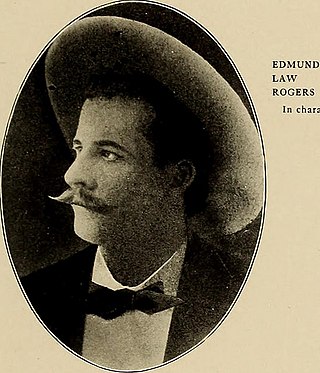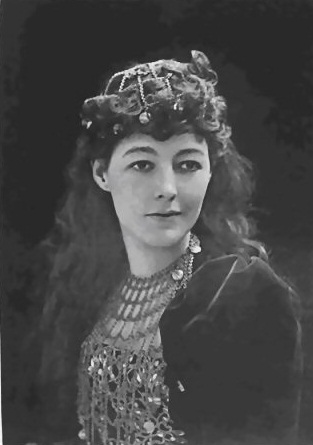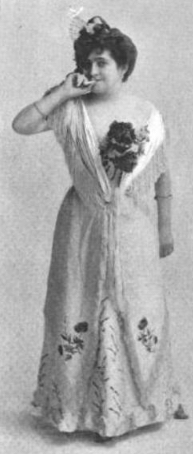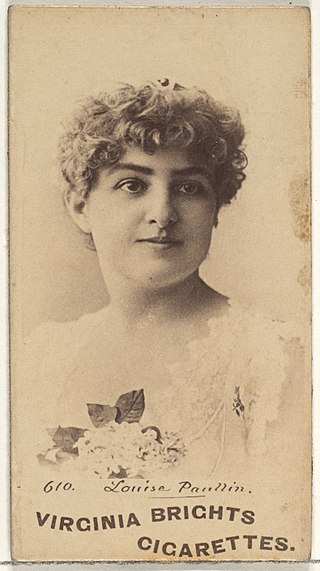
Charles Manners was a British bass singer and opera company manager. His earliest performances were with the D'Oyly Carte Opera Company, first as a chorus member and then as a principal, creating the role of Private Willis in Iolanthe in 1882. After leaving D'Oyly Carte the following year, he sang with several opera companies, most notably the Carl Rosa Opera Company and Covent Garden. In 1898, he and his wife, the singer Fanny Moody, set up their own company, dedicated to presenting opera in English.

Edmund Law Rogers, also known by the stage name Leslie Edmunds, was an American stage actor. He was also a founding father of the Kappa Sigma fraternity at the University of Virginia.

Geraldine Ulmar was an American singer and actress, best known for her performances in soprano roles of the Gilbert and Sullivan operas with the D'Oyly Carte Opera Company.

Edward Solomon was an English composer, conductor, orchestrator and pianist. He died at age 39 by which time he had written dozens of works produced for the stage, including several for the D'Oyly Carte Opera Company, including The Nautch Girl (1891). Early in his career, he was a frequent collaborator of Henry Pottinger Stephens. He had a bigamous marriage with Lillian Russell in the 1880s.
The American Opera Company was the name of six different opera companies active in the United States. The first company was founded in New York City in February, 1886, but lasted only one season. The second company grew out of the Eastman School of Music in Rochester, New York, and was active from 1924 up until 1930, when it went bankrupt following the Wall Street Crash of 1929. The third company, located in Trenton, New Jersey, was active in 1937 only. The fourth company was actively performing in Philadelphia from 1946 through 1950.

Frederic Lewis Tuffley, better known by his stage name, Eric Lewis, was an English comedian, actor and singer. In a career spanning five decades, he starred in numerous comedies and in a few musical comedy hits, but he is probably best remembered today as the understudy to George Grossmith in the Gilbert & Sullivan comic operas of the 1880s who left the D'Oyly Carte Opera Company just in time to give Henry Lytton his big break.

Isabelle Urquhart, also known as Belle Urquhart, was an American contralto and actress, noted for her performances in comic opera and musical comedy.

Emma Marcy Raymond was an American musician, composer, and author of operetta, songs and piano music. She was one of very few women in her day who had composed the entire music of an opera and lived to see it produced.

Mary Augusta "May" Yohé was an American musical theatre actress. She began her career in 1886 with the McCaull Comic Opera Company in New York and Chicago. After other performances in the United States, she quickly gained success on the London stage, beginning in 1893. There she created the title role in the hit show Little Christopher Columbus in 1894.

Katie Seymour was a British Victorian burlesque and Edwardian musical comedy entertainer who was remembered primarily for her dancing. She was considered, if not the first, one of the first to perform a style of dance called the skirt dance. Seymour began in song and dance routines at a very young age and would go on to appear in a string of highly successful long-running musicals staged at London's Gaiety Theatre during the 1890s. She fell ill in 1903 while on a theatrical tour of British South Africa and died not long after her return voyage home.

Jennie McNulty or Jenny McNulty was an American-born British actress. Beginning her career as a Gaiety Girl, she went on to act in featured roles on the London stage in musical theatre around the close of the 19th century, including comic operas and operettas, Victorian burlesques, farces and Edwardian musical comedies.

Mabel Bert was an Australian-born American actress.

Ulrika "Ullie" Akerstrom was an American actress, dancer, playwright, and vaudeville performer.

Mamie Gilroy was an American actress and singer in musical theatre.

Rosa Olitzka was a German-born contralto singer. She sang with the Metropolitan Opera from 1895 to 1901, and with the Chicago Opera from 1910 to 1911.

Louise Paullin, sometimes seen as Louisa Paullin, was an American stage actress.
Louis Honig was a composer, pianist, and Professor of Music at his Academy of Music in the East End of London.

Kate Rolla, born Katherine Doane Wheat, was an American opera singer.

Libbie McCarthy [Macarty] Conger, better known publicly by her stage name Dorothy Morton, was an American stage actress and soprano who had an active career in mainly light operas and musical theatre from the 1880s until her retirement from the stage in 1918. She also occasionally appeared on the stage in grand opera roles like Santuzza in Cavalleria rusticana and Marguerite in Faust, and in vaudeville. She is best remembered for her work on Broadway; including creating the role of Cleopatra in Victor Herbert's The Wizard of the Nile (1895) and portraying the title role in the United States premiere of Sidney Jones' The Geisha (1896); the latter part the most significant of her career.

Marie Kunkel Zimmerman, born Mamie R. Kunkel, was an American soprano of the concert stage. She began her acting career as a child opposite her father; the theatre manager, blackface minstrel show entertainer, actor, and singer-songwriter George Kunkel. In the early 1880s she began performing as a soprano. She co-authored the suffragist anthem "Votes for Women: Suffrage Rallying Song" with her husband, composer and concert singer Edward M. Zimmerman.



















